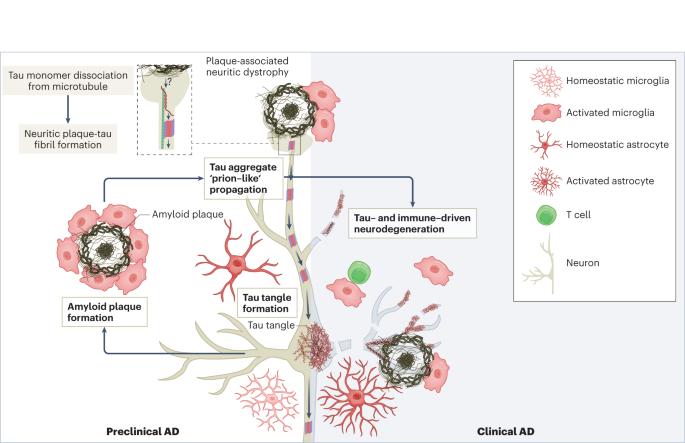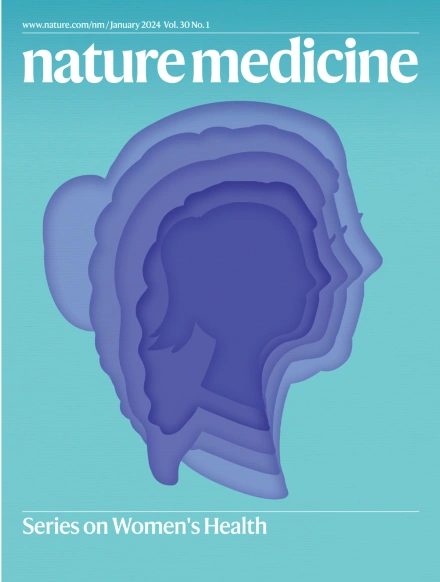阿尔茨海默病的新兴诊断和治疗方法。
IF 58.7
1区 医学
Q1 BIOCHEMISTRY & MOLECULAR BIOLOGY
引用次数: 0
摘要
阿尔茨海默病(AD)是世界上痴呆症最常见的病因,但直到最近,减缓或阻止其临床进展的策略在很大程度上仍然难以捉摸。这篇综述强调了生物标志物技术和治疗发展的最新进展,以改善AD的诊断和治疗。我们回顾了最近的结果,这些结果使AD的病理分期能够通过神经成像和基于液体的生物标志物进行,特别强调淀粉样蛋白、tau和神经炎症在疾病发病机制中的作用。我们讨论了从随机对照试验中吸取的教训,包括一些支持某些抗淀粉样蛋白抗体在AD轻度症状期减缓认知能力下降的建议。此外,我们强调了新发现的治疗靶点的证据,这些靶点可能能够改变AD的发病机制和进展。总的来说,这些最新的发现和它们开辟的研究方向有可能将AD临床护理转向对患者有最大益处的疾病改良治疗策略。本文章由计算机程序翻译,如有差异,请以英文原文为准。

Emerging diagnostics and therapeutics for Alzheimer disease
Alzheimer disease (AD) is the most common contributor to dementia in the world, but strategies that slow or prevent its clinical progression have largely remained elusive, until recently. This Review highlights the latest advances in biomarker technologies and therapeutic development to improve AD diagnosis and treatment. We review recent results that enable pathological staging of AD with neuroimaging and fluid-based biomarkers, with a particular emphasis on the role of amyloid, tau and neuroinflammation in disease pathogenesis. We discuss the lessons learned from randomized controlled trials, including some supporting the proposal that certain anti-amyloid antibodies slow cognitive decline during the mildly symptomatic phase of AD. In addition, we highlight evidence for newly identified therapeutic targets that may be able to modify AD pathogenesis and progression. Collectively, these recent discoveries—and the research directions that they open—have the potential to move AD clinical care toward disease-modifying treatment strategies with maximal benefits for patients. This Review summarizes recent advances in biomarkers and therapies for Alzheimer disease—the products of decades of research—and discusses the challenges, gaps and clinical implications.
求助全文
通过发布文献求助,成功后即可免费获取论文全文。
去求助
来源期刊

Nature Medicine
医学-生化与分子生物学
CiteScore
100.90
自引率
0.70%
发文量
525
审稿时长
1 months
期刊介绍:
Nature Medicine is a monthly journal publishing original peer-reviewed research in all areas of medicine. The publication focuses on originality, timeliness, interdisciplinary interest, and the impact on improving human health. In addition to research articles, Nature Medicine also publishes commissioned content such as News, Reviews, and Perspectives. This content aims to provide context for the latest advances in translational and clinical research, reaching a wide audience of M.D. and Ph.D. readers. All editorial decisions for the journal are made by a team of full-time professional editors.
Nature Medicine consider all types of clinical research, including:
-Case-reports and small case series
-Clinical trials, whether phase 1, 2, 3 or 4
-Observational studies
-Meta-analyses
-Biomarker studies
-Public and global health studies
Nature Medicine is also committed to facilitating communication between translational and clinical researchers. As such, we consider “hybrid” studies with preclinical and translational findings reported alongside data from clinical studies.
 求助内容:
求助内容: 应助结果提醒方式:
应助结果提醒方式:


